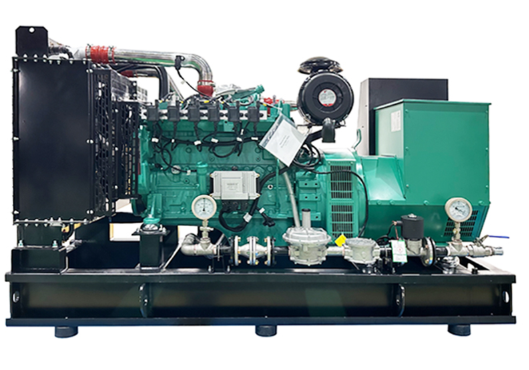संपर्क जानकारी
G3120, नॉर्थ बिल्डिंग, संख्या 1, सिट्रॉन रोड, इंटरनेशनल ऑटोमोबाइल सिटी, फार्मास्यूटिकल हाई-टेक औद्योगिक विकास क्षेत्र, ताइज़्होऊ शहर, जियांग्सू प्रांत
बायोगैस जनरेटर सेट के कारण नवीकरणीय ऊर्जा और जैव अपशिष्ट प्रबंधन के बीच एक मजबूत कड़ी बनी है। बायोगैस कृषि के उप-उत्पादों, भोजन के अवशेषों और औद्योगिक जैव अपशिष्ट जैसे जैविक अपशिष्टों से प्राप्त स्वच्छ ईंधन है। इस संयोजित जनरेटर सेट ने ऊर्जा स्रोत के रूप में जीवाश्म ईंधन को समाप्त करने में सफलता प्राप्त की है। खतरनाक उत्सर्जन से मुक्त ऊर्जा और पर्यावरण सुरक्षा की खोज में, बायोगैस सेट एक दोहरा समाधान के रूप में उभरे हैं। जीवाश्म ईंधन पर निर्भरता कम करके, यह दोनों जगहों पर वैश्विक कार्बन तटस्थ लक्ष्य को पूरा करता है।
बायोगैस सेट और बैग जनरेटर को एकीकृत करने के केंद्र में 'जीवन चक्र' चक्रवात आर्थिक मॉडल है। कार्बनिक अपशिष्टों को अनैरोबिक पाचन प्रणालियों में भेजने के लिए एकत्रित किया जाता है जहां सूक्ष्मजीव जैव गैस के उत्पादन के लिए कार्बनिक अपशिष्टों को तोड़ते हैं। इस बायोगैस को शुद्ध करके जनरेटर सेट में जमा किया जाता है जहां रासायनिक ऊर्जा को विद्युत और ताप ऊर्जा में परिवर्तित किया जाता है। प्रक्रिया के अंत में शेष कचरा, डाइजेस्टेट, एक कार्बनिक उर्वरक है जो चक्र को पूरा करता है। इस प्रणाली का एकीकरण लैंडफिल से निकलने वाले अतिप्रवाह और यौगिकों को समाप्त करता है। कचरा कच्चे होने से वायुमंडल से निकलते हुए मीथेन के रूप में भी खतरे हैं।

अपशिष्ट प्रबंधन के मामले में, बायोगैस जनरेटर सेट कई लाभ प्रदान करते हैं। पारंपरिक जीवाश्म ईंधन जनरेटरों की तुलना में, इनके उत्सर्जन कम होते हैं और नाइट्रोजन ऑक्साइड, कार्बन मोनोऑक्साइड और कणों की मात्रा बहुत कम होती है। उपयोग के संदर्भ में, बायोगैस संचालन लागत को कम करता है, क्योंकि कार्बनिक अपशिष्ट अधिक सुलभ होता है और कभी-कभी इसके निपटान की लागत होती है। वे एक विश्वसनीय और एकरूप बिजली आउटपुट प्रदान करते हैं जो ऑन-ग्रिड और ऑफ-ग्रिड उपयोग की सुविधा देता है। इसके अतिरिक्त, पूरी प्रणाली संसाधनों के पुनर्चक्रण को सुविधाजनक बनाती है और सतत विकास को बनाए रखती है।
अपशिष्ट प्रबंधन में विभिन्न परिदृश्यों में विशिष्ट बायोगैस जनरेटर समाधानों की आवश्यकता होती है। बड़े नगरपालिका अपशिष्ट उपचार संयंत्र हैं, जिनमें बड़े पैमाने पर उच्च क्षमता वाले जनरेटर सेट हैं जो बड़े पैमाने पर बायोगैस उत्पादन को पूरा कर सकते हैं। इस बीच छोटे से मध्यम पैमाने के खेतों के लिए, लाभ कम अपशिष्ट और अधिक कॉम्पैक्ट, पोर्टेबल इकाई प्रदान करने में है। अनुकूलित बायोगैस में कुशल दहन और उच्च संरचनात्मक अखंडता सुनिश्चित करने के लिए विशेष डिजाइन है। अपशिष्ट मात्रा, बायोगैस घटकों और ऊर्जा की मांग के अनुसार पिवोट करने की क्षमता इन जनरेटर सेटों को विभिन्न बाजारों और उद्योगों में उपयोग करने योग्य बनाती है।
समय के साथ समान प्रदर्शन बनाए रखने की क्षमता और टिकाऊपन बायोगैस जनरेटर सेट के लिए महत्वपूर्ण है। इन्हें चरम परिचालन परिस्थितियों में स्थिर रूप से काम करने के लिए डिज़ाइन किया गया है तथा इनमें विशेष ईंधन प्रणाली होती है जिस पर बायोगैस का कोई क्षरणकारी प्रभाव नहीं पड़ता। डिलीवरी से पहले कठोर परीक्षण किए जाते हैं ताकि सुनिश्चित किया जा सके कि प्रत्येक इकाई उत्कृष्ट स्थिति में कारखाने से बाहर आए। बिक्री के बाद उपलब्ध व्यापक सहायता के साथ, ये जनरेटर सेट दीर्घकालिक विश्वसनीयता और कम बंद-समय प्रदान करते हैं, जिससे अपशिष्ट-से-ऊर्जा सुविधा में सभी संचालन की दक्षता में सुधार होता है।
अपशिष्ट प्रबंधन में बायोगैस जनरेटर सेट के उपयोग से कार्बन तटस्थता प्राप्त करने की दिशा में एक बड़ा कदम है। वे कार्बन उत्सर्जन को कम करने में सहायता करते हैं, जो कार्बनिक अपशिष्ट को नवीकरणीय ऊर्जा में परिवर्तित करके और इस प्रकार जीवाश्म ईंधन के उपयोग तथा अपशिष्ट के अपघटन के दौरान उत्सर्जित ग्रीनहाउस गैसों को कम करके होता है। इन कारणों के साथ-साथ अन्य सभी सकारात्मक गुणों के कारण, जलवायु परिवर्तन के अनुकूलन और उसके प्रभाव कम करने पर केंद्रित सरकारों, व्यवसायों और संगठनों द्वारा इन्हें लक्ष्य बनाया गया है। अपशिष्ट प्रबंधन का नवीकरणीय ऊर्जा उत्पादन के साथ समामेलन बायोगैस जनरेटर सेट को जलवायु परिवर्तन के खिलाफ लड़ाई की पहली पंक्ति में ले आया है।